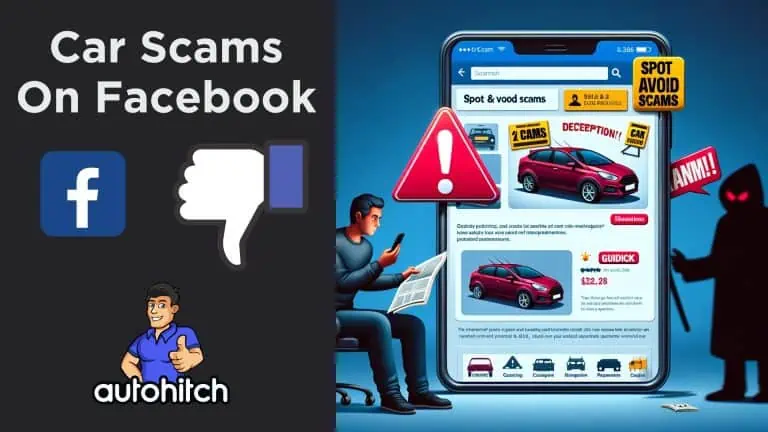With over a billion users, Facebook Marketplace is rife with opportunities. Unfortunately, those opportunities come with risks.
As car scams on Facebook become more of a problem, I thought it would be important to create a guide based on my own experience with Facebook Marketplace to spot the most popular car scams and avoid them with ease.
Additionally, if you have already been the victim of one of these scams, I will walk you through the next steps you should take immediately.
Table of Contents
Red Flags – Warning Signs of a Car Scam
Facebook Marketplace Car Scams have red flags just like any other type of scam, and below, I have created a table to easily identify the signs that someone is trying to take advantage of you:
| Red Flag | Description |
|---|---|
| Suspicious seller profile | No photo, friends, or past sales |
| Vague details about the car | Can’t answer questions about parts, repairs, etc. |
| Refuses to meet in person | Won’t allow you to inspect the car up close |
| Photos don’t match description | Reverse image search (On Google) shows they’re from other listings |
| Price far below market value | Check a car valuation site like Kelley Blue Book |
| Pushy demands for quick action | Creating false urgency is a common scam tactic |
| Requests unusual payment types | Wire transfers, prepaid cards, QR codes, etc. are unsafe |
Verifying Car Listings to Avoid Scams
Scammers are experts at mimicking legitimate sellers. But a little due diligence can easily sniff them out.
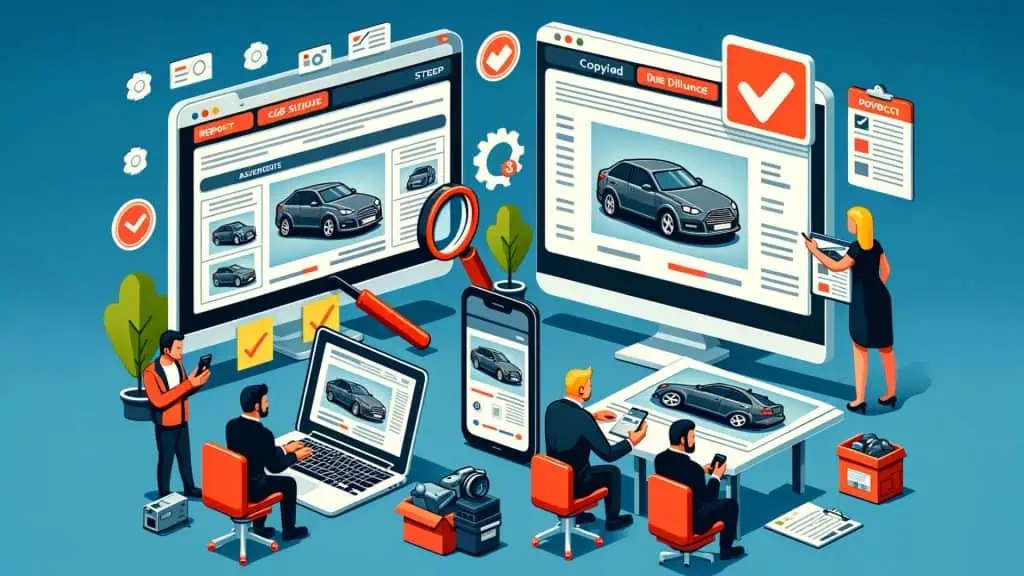
When assessing Marketplace car listings:
- Vet the Seller’s Profile
Scan for profile and cover photos, friends, and previous sales. Missing or sparse details could indicate a fake account. Verify any dealership names.
- Ask Detailed Questions
Legitimate sellers know their vehicle inside out. Press for specifics on maintenance, parts, damage, and usage quirks. Fuzzy or dubious answers are a red flag.
- Request Photos and Video
Ask for recent pictures taken from multiple angles and a live video call. These prove the seller possesses the vehicle. Stock or doctored images suggest a scam.
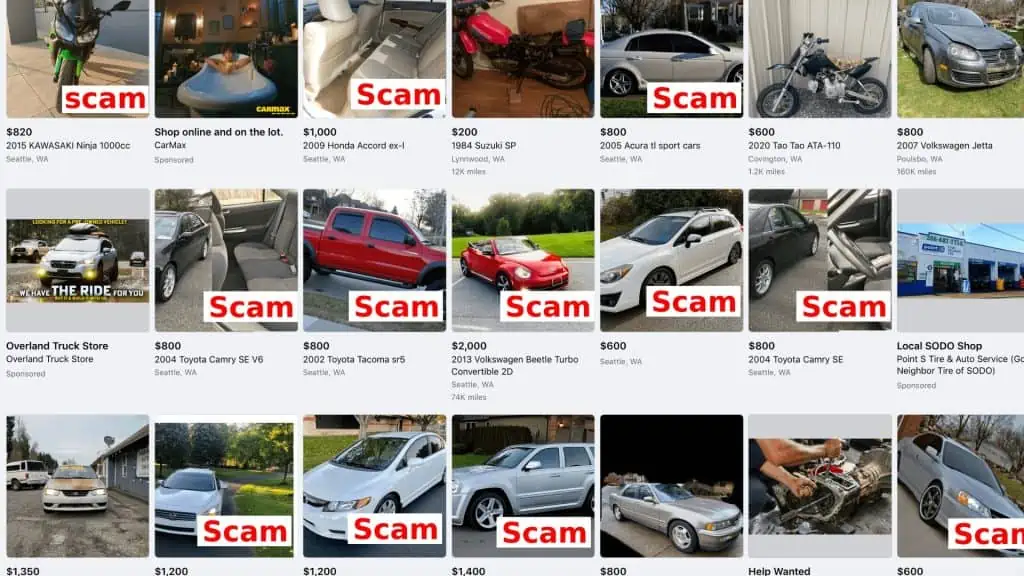
- Compare VIN Details
Run the 17-digit VIN at CARFAX or AutoCheck. Make sure the mileage, ownership, and accident history match the seller’s descriptions.
- Meet in Person Before Buying
Inspect the car thoroughly. Test drive it. Bring a mechanic or car-savvy friend if possible. Scammers will refuse in-person meetings.
- Google Search Images
Con artists snag photos from other listings online. Reverse image search via Google to see if they match other sites. Identical results indicate fakes.
Top Car Scams Targeting Buyers on Facebook
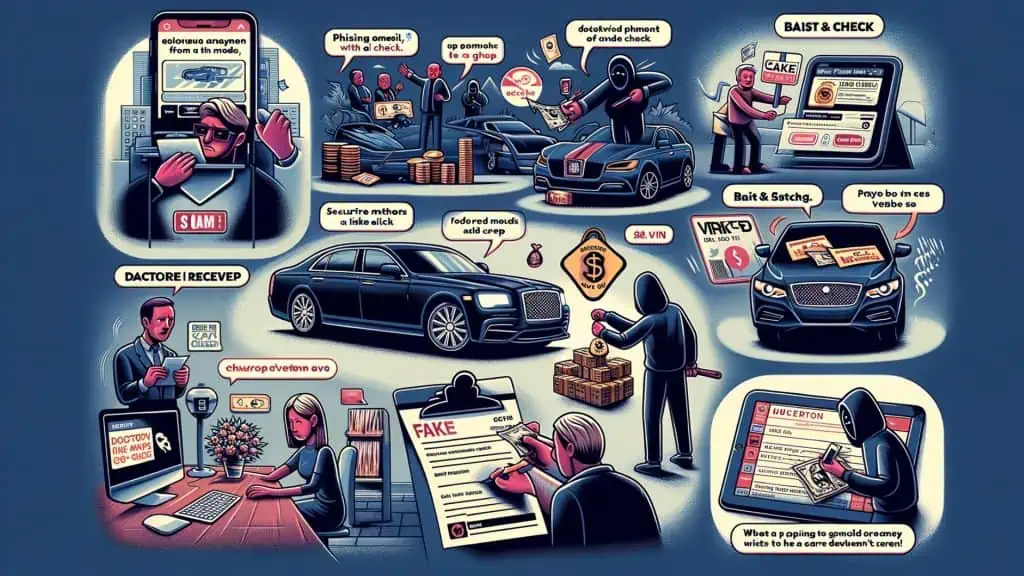
From phony payment schemes to bait-and-switch rip-offs, here are the most prevalent tactics fraudsters use against Marketplace car shoppers:
- Phishing Scams
Scammers send links prompting you to “log in” to swipe passwords or install malware. Never enter info on unverified pages.
- Fake VIN Checks
Con artists create bogus VIN check sites to charge for free reports. Only use services approved by the National Motor Vehicle Title Information System.
- Payment Cons
Crooks use bad checks, stolen credit cards, fake escrows, and more to make you think you got paid. Require cash, services with buyer protection like PayPal, or complete transactions at your bank.
- Counterfeit Cars
Knockoff luxury vehicles get listed at unrealistic prices. Research prices for desired models and inspect cars locally before buying to avoid cheap imitations.
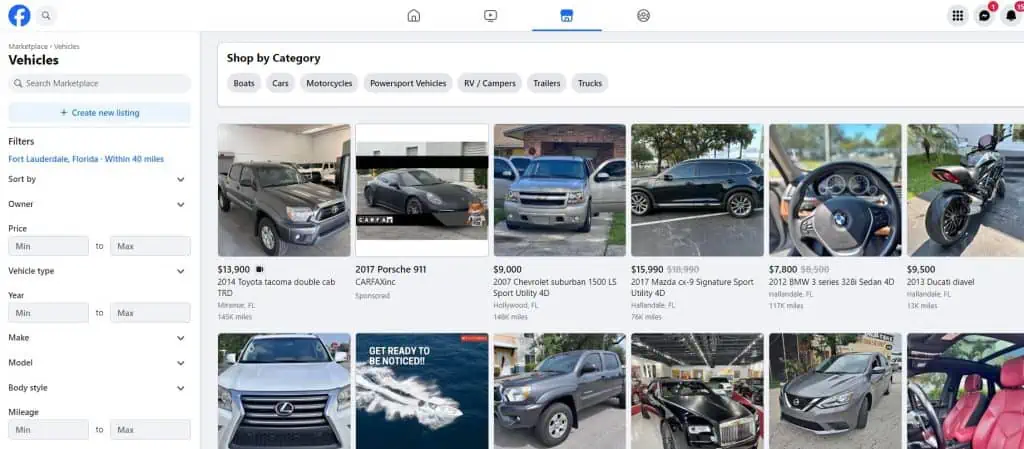
- Bait and Switch
The car in the ad transforms into a lower-quality clunker once purchased. Insist on seeing the exact vehicle in the listing before exchanging funds.
- Doctored Receipts
Scammers forge screenshots to make it appear payments were sent. Only believe real deposit notices from your bank – not images.
- Advance Fee Requests
Bogus sellers demand upfront “deposits” or “fees” for coveted but imaginary cars. Never pay for a vehicle until you’ve inspected it yourself.
- Rental Scams
Con artists pose as landlords or rental car firms to swindle “application fees.” Verify properties and landlords physically before sending money.
Top Car Scams Aimed at Sellers on Facebook
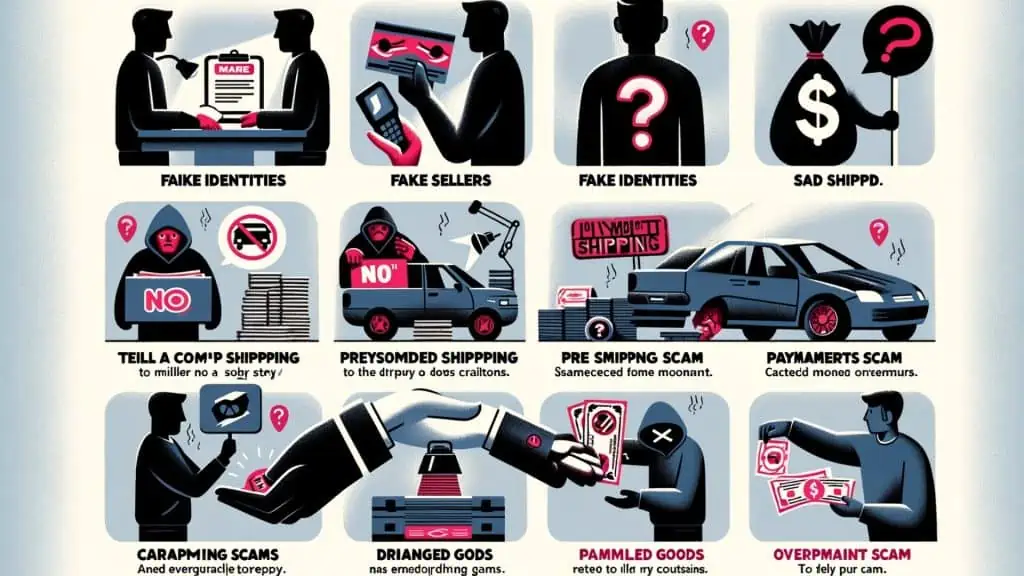
Swindlers also craft clever schemes to cheat Marketplace car sellers:
Fake Names and Phone Numbers
Fraudsters create aliases and fake profiles or use redirected phone numbers through services like Google Voice. Vet buyers by Googling names and phone numbers, checking Facebook activity, and requiring physical ID at purchase.
Sob Stories or Pitty
Scammers concoct elaborate personal tales to elicit an emotional response to persuade you to bypass standard procedures. Stick to your guns.
Pre Paid Shipping
People will offer to pay you your full asking price along with extra money for shipping. They might even offer to pay more for shipping to “Compensate you for your time”, and appear generous.
Overpayment
This is similar to pre-paid shipping, but in this case, scammers send excess funds and request you wire back the difference. Their first “payment” is fraudulent. You lose any money returned.
Switching Payment
A cashier’s check switcheroo, cash stuffed with counterfeit bills, or a reversed credit card charge leaves you unpaid. Accept only verified funds that fully clear.
Damaged Merchandise
Buyers take delivery, then falsely claim there is something about the car that’s wrong, which you did not disclose. People usually do this to get a portion of their money back either because they want a fraudulent discount or because they plan to resell the car and use your partial refund as their profit margin.
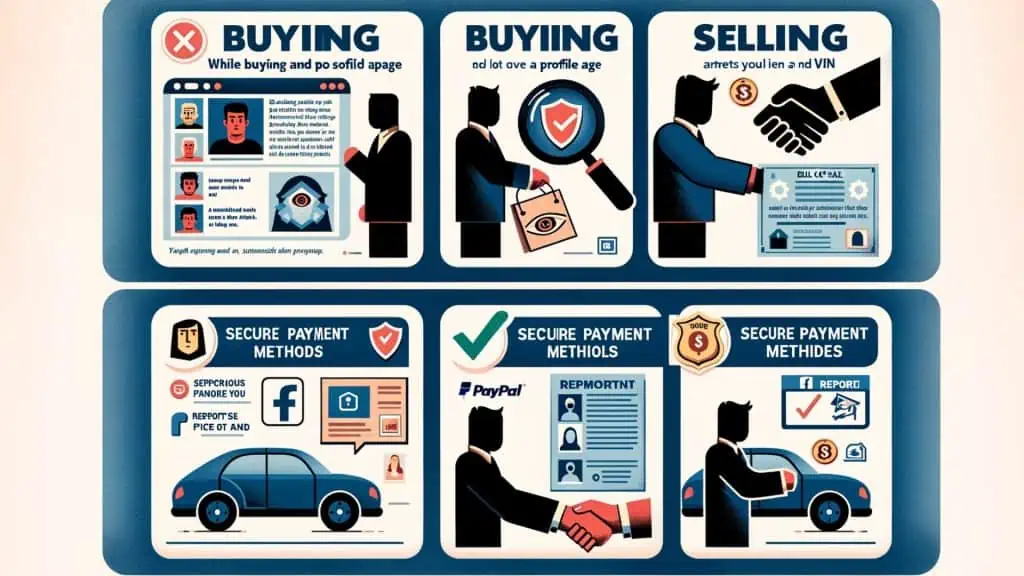
How to Stay Safe Buying and Selling Cars on Facebook
While scams arise constantly, you can outsmart scammers by:
Safely Buying and Selling Cars on Facebook Chart:
| Safety Tips | Description |
|---|---|
| Vet buyer/seller profiles | Check account age, friends, activity, reviews, etc. |
| Ask specific questions | Legit sellers know car details intimately |
| Meet to inspect car first | Test drive the exact vehicle advertised |
| Compare VIN reports | Verify mileage and history match seller info |
| Use protected payments | PayPal Goods, Facebook Checkout, cash at bank |
| Get buyer ID and bill of sale | Required for securing transaction |
| Report suspicious accounts | Facebook can disable potential scammers |
| Enable Facebook protections | Reviews, ratings, profile verifications boost security |
| Reporting shady accounts | Help keep the marketplace safe by reporting scams immediatly |
Facebook also offers protections like profile verifications, ratings, and purchase histories. Enable available safety features before deals.
Should I give VIN number on Facebook marketplace?
Yes, it is perfectly safe to give out your VIN Number to any potential buyers on Facebook Marketplace because the VIN doesn’t contain any personal information, only information about the vehicle.
What To Do if You’re Scammed on Facebook Marketplace
If you do get swindled, act quickly to minimize losses:
- Contact your bank to halt payments
- Report the fraud to local law enforcement
- Notify Facebook’s security team
- File a complaint with the FTC and BBB
- Sign up for credit monitoring to catch identity theft
My Final Thoughts
With awareness and smart precautions, Facebook Marketplace can still offer access to great vehicle deals safely. Approach buying and selling with eyes wide open. Don’t let a savvy scammer take you for a ride.
Sources and Citations:
- https://www.reddit.com/r/Cartalk/comments/rsi8dt/why_do_these_bots_on_fb_marketplace_want_my_vin/
- https://www.reddit.com/r/CarTalkUK/comments/14cnbsp/anyone_noticed_a_new_flooding_of_fake_adverts_on/
- https://www.androidpolice.com/avoid-facebook-marketplace-scams-explainer/
- https://www.gobankingrates.com/money/finance/facebook-marketplace-scams/
- https://youtu.be/rp-MExIUC_M?si=XgzTHRFDIR8E1dJj

